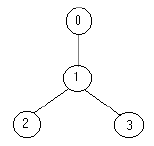HDU 1054 Strategic Game(二分图最小点覆盖)
Strategic Game
Time Limit: 20000/10000 MS (Java/Others) Memory Limit: 65536/32768 K (Java/Others)
Total Submission(s): 2916 Accepted Submission(s): 1217
Problem Description
Bob enjoys playing computer games, especially strategic games, but sometimes he cannot find the solution fast enough and then he is very sad. Now he has the following problem. He must defend a medieval city, the roads of which form a tree. He has to put the minimum number of soldiers on the nodes so that they can observe all the edges. Can you help him?
Your program should find the minimum number of soldiers that Bob has to put for a given tree.
The input file contains several data sets in text format. Each data set represents a tree with the following description:
the number of nodes
the description of each node in the following format
node_identifier:(number_of_roads) node_identifier1 node_identifier2 ... node_identifier
or
node_identifier:(0)
The node identifiers are integer numbers between 0 and n-1, for n nodes (0 < n <= 1500). Every edge appears only once in the input data.
For example for the tree:

the solution is one soldier ( at the node 1).
The output should be printed on the standard output. For each given input data set, print one integer number in a single line that gives the result (the minimum number of soldiers). An example is given in the following table:
Your program should find the minimum number of soldiers that Bob has to put for a given tree.
The input file contains several data sets in text format. Each data set represents a tree with the following description:
the number of nodes
the description of each node in the following format
node_identifier:(number_of_roads) node_identifier1 node_identifier2 ... node_identifier
or
node_identifier:(0)
The node identifiers are integer numbers between 0 and n-1, for n nodes (0 < n <= 1500). Every edge appears only once in the input data.
For example for the tree:

the solution is one soldier ( at the node 1).
The output should be printed on the standard output. For each given input data set, print one integer number in a single line that gives the result (the minimum number of soldiers). An example is given in the following table:
Sample Input
4 0:(1) 1 1:(2) 2 3 2:(0) 3:(0) 5 3:(3) 1 4 2 1:(1) 0 2:(0) 0:(0) 4:(0)
Sample Output
1 2
Source
Recommend
JGShining
此题就是二分图的最小点覆盖。
点比较多,1500个。普通的匈牙利算法会超时的。可以用邻接表实现匈牙利算法。
但是我启用二分匹配中的战斗机:Hopcroft-Carp的算法。专门处理点比较多的情况。
好像也可以用树形DP做。等下来学习下。
/* HDU 1054 Strategic Game 就是要找最小点覆盖。 一个二分图中的最大匹配数等于这个图中的最小点覆盖数 但这我们要扩展结点为n-n的匹配,无向图。 所以就是二分匹配数除于2就是答案了。 结点有1500个。用普通的匈牙利算法应该会超时的。 启用Hopcroft-Carp的算法。 G++ 6156ms 9428K */ #include<stdio.h> #include<algorithm> #include<string.h> #include<iostream> #include<queue> using namespace std; /* ********************************************* 二分图匹配(Hopcroft-Carp的算法)。 初始化:g[][]邻接矩阵 调用:res=MaxMatch(); Nx,Ny要初始化!!! 时间复杂大为 O(V^0.5 E) 适用于数据较大的二分匹配 需要queue头文件 ********************************************** */ const int MAXN=1505; const int INF=1<<28; int g[MAXN][MAXN],Mx[MAXN],My[MAXN],Nx,Ny; int dx[MAXN],dy[MAXN],dis; bool vst[MAXN]; bool searchP() { queue<int>Q; dis=INF; memset(dx,-1,sizeof(dx)); memset(dy,-1,sizeof(dy)); for(int i=0;i<Nx;i++) if(Mx[i]==-1) { Q.push(i); dx[i]=0; } while(!Q.empty()) { int u=Q.front(); Q.pop(); if(dx[u]>dis) break; for(int v=0;v<Ny;v++) if(g[u][v]&&dy[v]==-1) { dy[v]=dx[u]+1; if(My[v]==-1) dis=dy[v]; else { dx[My[v]]=dy[v]+1; Q.push(My[v]); } } } return dis!=INF; } bool DFS(int u) { for(int v=0;v<Ny;v++) if(!vst[v]&&g[u][v]&&dy[v]==dx[u]+1) { vst[v]=1; if(My[v]!=-1&&dy[v]==dis) continue; if(My[v]==-1||DFS(My[v])) { My[v]=u; Mx[u]=v; return 1; } } return 0; } int MaxMatch() { int res=0; memset(Mx,-1,sizeof(Mx)); memset(My,-1,sizeof(My)); while(searchP()) { memset(vst,0,sizeof(vst)); for(int i=0;i<Nx;i++) if(Mx[i]==-1&&DFS(i)) res++; } return res; } //**************************************************************************/ int main() { //freopen("in.txt","r",stdin); //freopen("out.txt","w",stdout); int n; int u,k,v; while(scanf("%d",&n)!=EOF) { memset(g,0,sizeof(g)); for(int i=0;i<n;i++) { scanf("%d:(%d)",&u,&k); while(k--) { scanf("%d",&v); g[u][v]=1; g[v][u]=1; } } Nx=Ny=n; int ans=MaxMatch(); printf("%d\n",ans/2); } return 0; }
再附上一个用vector建立邻接表实现的匈牙利算法。效率比上面的高》
/* HDU 1054 用STL中的vector建立邻接表实现匈牙利算法 效率比较高 G++ 578ms 580K */ #include<stdio.h> #include<iostream> #include<algorithm> #include<string.h> #include<vector> using namespace std; //************************************************ const int MAXN=1505; int linker[MAXN]; bool used[MAXN]; vector<int>map[MAXN]; int uN; bool dfs(int u) { for(int i=0;i<map[u].size();i++) { if(!used[map[u][i]]) { used[map[u][i]]=true; if(linker[map[u][i]]==-1||dfs(linker[map[u][i]])) { linker[map[u][i]]=u; return true; } } } return false; } int hungary() { int u; int res=0; memset(linker,-1,sizeof(linker)); for(u=0;u<uN;u++) { memset(used,false,sizeof(used)); if(dfs(u)) res++; } return res; } //***************************************************** int main() { int u,k,v; int n; while(scanf("%d",&n)!=EOF) { for(int i=0;i<MAXN;i++) map[i].clear(); for(int i=0;i<n;i++) { scanf("%d:(%d)",&u,&k); while(k--) { scanf("%d",&v); map[u].push_back(v); map[v].push_back(u); } } uN=n; printf("%d\n",hungary()/2); } return 0; }
人一我百!人十我万!永不放弃~~~怀着自信的心,去追逐梦想



